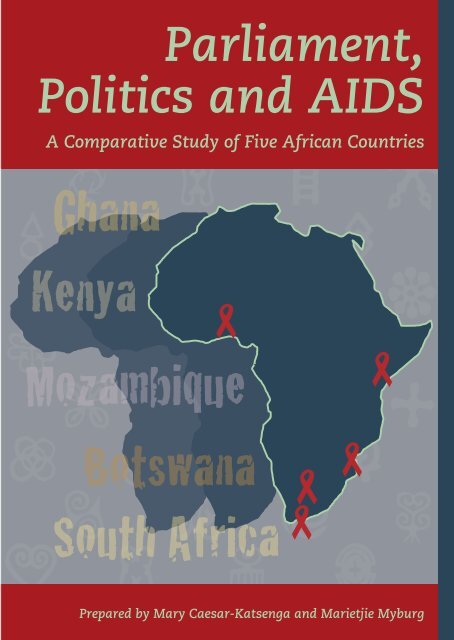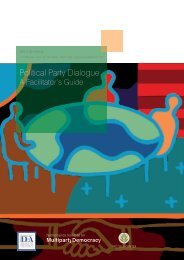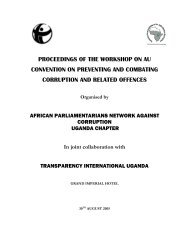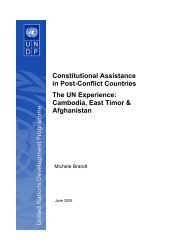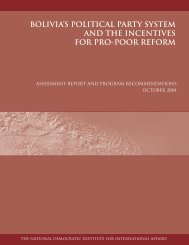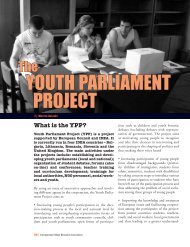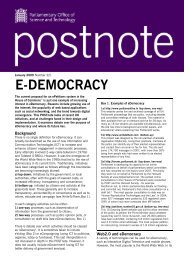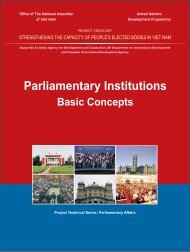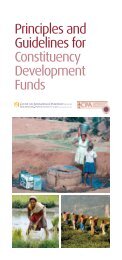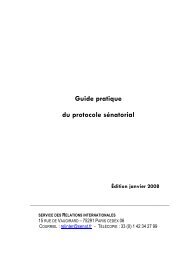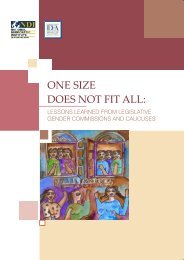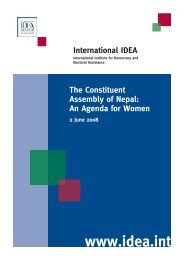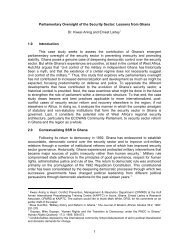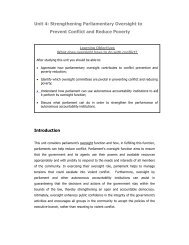Download PDF - Parliamentary Centre
Download PDF - Parliamentary Centre
Download PDF - Parliamentary Centre
- No tags were found...
You also want an ePaper? Increase the reach of your titles
YUMPU automatically turns print PDFs into web optimized ePapers that Google loves.
Parliament,Politics and AidsA Comparative Study of Five African CountriesPrepared by Mary Caesar-Katsenga and Marietjie Myburg
Parliaments,politics and HIV/AIDS
This report is a synthesis report from a comparative study in Botswana, Ghana, Kenya, Mozambique and SouthAfrica on the effective use of parliamentary oversight in respect of the national responses to HIV/AIDS. The projectwas made possible by the Canadian <strong>Parliamentary</strong> <strong>Centre</strong> via the Africa-Canada <strong>Parliamentary</strong> StrengtheningProgramme funded by the Canadian International Development Agency through the Canada Fund for Africa, andcoordinated and implemented by the Governance and AIDS Programme of Idasa (Idasa-GAP)Published by Idasa, 6 Spin Street, Cape Town© Governance and AIDS Programme, Idasa, 2006First published 2006ISBN 1-920118-22-5Editing, design and production by Idasa PublishingCover design by Magenta MediaBound and printed by Logo Print, Cape TownAll rights reserved. No part of this publication may be reproduced or transmitted, in any form or by any means,without prior permission from the publisher.
IDASA’s Governance and AIDS ProgrammeIdasa is an independent public interest organisation committed to promoting sustainable democracy in SouthAfrica and elsewhere by building democratic institutions, educating citizens and advocating social justice.The Governance and AIDS Programme conducts innovative research to provide evidence of the impact of HIV/AIDS on governance and to raise wider awareness through strategic and general dissemination of findingsGAP staff:Kondwani Chirambo, programme managerVasanthie Naicker, administratorMarietjie Myburg, regional co-ordinator (communication)Mary Caesar-Katsenga, research facilitatorJosina Machel, co-ordinator, capacity buildingNhlanhla Ndlovu, manager, AIDS Budget UnitRabelani Daswa, researcher/ trainer, AIDS Budget UnitNobuntu Mbebetho, research assistant, AIDS Budget Unit
AcknowledgementsThis research project was a collaboration between the Canadian <strong>Parliamentary</strong> <strong>Centre</strong> (PC) and Idasa’s Governanceand AIDS Programme (Idasa-GAP). We would like to thank the Canadian PC for their programmatic inputand financial support. In particular, we thank Ms Christine Ivory, regional co-ordinator, <strong>Parliamentary</strong> SupportProgramme, Mr Steven Langdon, director of the Africa-Canada <strong>Parliamentary</strong> Support Programme and Ms AnnaMiller, who was a staff member of the PC when the project started.This synthesis report was compiled from research papers prepared by the five participating countries: Botswana,Ghana, Kenya, Mozambique and South Africa. Idasa-GAP thanks the institutions, the researchers andthe research assistants for their work:• Botswana: The Southern African <strong>Centre</strong> for Policy Development and Dialogue, research coordinator, Dr GloriaSomolekae.• Ghana: The <strong>Centre</strong> for Democratic Development (CDD), research coordinator, Mr Franklin Odoro.• Kenya: Department of Economics, University of Nairobi and the Institute of Policy Analysis and Research(IPAR), research coordinator, Dr Urbanus Kioko.• Mozambique: Ms Josina Machel, independent research consultant based in Maputo (now with Idasa-GAP).• South Africa: Idasa, research coordinators, Mr Nhlanhla Ndlovu (AIDS Budget Unit) and Ms Mary Caesar-Katsenga (Idasa-GAP).We are grateful for the contributions of a number of interns who were based at Idasa’s Pretoria office. In particularMr Ryan Schwartz of Stanford University for literature review, editing, comments on the country reportsand for commenting on previous versions of the synthesis report.All the researchers thank Members of Parliament and resource persons in the five countries for their participationin the project.Kondwani Chirambo, programme managerMary Caesar-Katsenga, research facilitator
ContentsPage1 Introduction 11.1 Problem statement 11.2 Background 11.3 Rationale for the research 22 Parliaments, politics and HIV – the research project 32.1 Objectives of the study 32.2 Methodology 32.3 Selecting the countries 42.4 The research questions 42.5 Research challenges 53 The significance of parliamentary oversight 63.1 Defining parliamentary oversight 63.2 Distinguishing between oversight and law-making 63.3 <strong>Parliamentary</strong> mechanisms and institutions for oversight 73.4 Oversight by other political institutions 104 HIV, AIDS and democratic challenges 105 Research findings 125.1 HIV, AIDS and parliamentary systems 125.2 HIV, AIDS and the electoral system 135.3 Oversight by parliamentary committees 135.4 <strong>Parliamentary</strong> committees and the political leadership 165.5 <strong>Parliamentary</strong> committees and extra-parliamentary institutions 165.6 Public participation 175.7 Legislative protection of PLWHAs 185.8 MPs as AIDS advocates 186 Recommendations and conclusions 196.1 HIV, AIDS and parliamentary systems 196.2 HIV, AIDS and the electoral system 196.3 Oversight by parliamentary committees 206.4 <strong>Parliamentary</strong> committees and the political leadership 216.5 <strong>Parliamentary</strong> committees and extra-parliamentary institutions 226.6 Public participation 226.7 Legislative protection of PLWHAs 226.8 MPs as AIDS advocates 236.9 Other recommendations and conclusions 23Acronyms and abbreviations 26Endnotes 28References 28
TablesPageTable 1 Women representatives in parliament following 2004 elections 13Table 2 <strong>Parliamentary</strong> committees and HIV/AIDS 14Appendix Botswana – Questions and motions on HIV/AIDS, 1995-2005 29
Parliaments, Politics and AIDS1. Introduction1.1 Problem statementThere is sufficient consensus that HIV/AIDS presents a crisis to societies and that the multisectoralimpact of the pandemic demands a multi-sectoral response. This means role-playersfrom different sectors must participate both in framing the issues as well as in the responses.An analysis of the institutions and their specific interventions will indicate that there is eitherinsufficient political responses or that the political responses have not sufficiently added to thesolution.The Governance and AIDS Programme of IDASA (IDASA-GAP) and the Canadian <strong>Parliamentary</strong><strong>Centre</strong> (PC) investigated the role of parliamentary oversight in national HIV/AIDS responses.Parliaments have been requested to engage with HIV/AIDS from a legislative point of view. Theymake and review laws and policies to deal with the problems of HIV/AIDS. In addition, individualMembers of Parliament (MPs) have been requested to provide leadership in their constituenciesand at national level. However, the institutional mechanisms required to support individualMPs in their efforts are not described. Furthermore, the political dimensions of parliament as ademocratic institution have not been sufficiently investigated.1.2 BackgroundSince the first diagnosis of AIDS more than two decades ago, many aspects of the pandemic havebeen and continue to be the subject of intensive investigation. These include the bio-medical,social, cultural, economic and political aspects of the pandemic. This research by IDASA-GAPand the Canadian PC focuses on the effective use of parliamentary oversight in the nationalresponses to HIV/AIDS. This specific enquiry is part of a broader theme of governance andHIV/AIDS and seeks to illustrate the need for stronger and sustained democratic governancepractices to help societies manage the pandemic more effectively as well as lay the foundationfor a more equal, democratic society in which HIV/AIDS is normalised and no longer a crisis.The research is an assessment of how the national parliaments of Botswana, Ghana, Kenya,Mozambique and South Africa use their oversight function to inform and monitor the nationalHIV/AIDS responses. Participating, and where applicable, other African parliaments can usethe findings and recommendations to improve the oversight function in their HIV/AIDS responses.On completion of the baseline study, there were two dissemination processes of the preliminaryfindings, providing opportunities for MPs to consider and comment on these findingsand share their experiences in relation to the themes reflected in the recommendations.In September 2005 the Canadian PC convened a Policy Dialogue Forum in Senegal 1 wherethe preliminary findings were presented. In February 2006 IDASA-GAP and the Canadian PCconvened a Regional Policy Dialogue Forum in South Africa. At this latter meeting MPs had
Parliaments, Politics and AIDSan opportunity to reflect not only on the findings but also to design practical interventions inlight of the recommendations. 2This research and the dissemination of its findings are part of a broader strategy by the CanadianPC and IDASA-GAP to build a critical mass of MPs who will play a prominent role in theanalysis, framing and evaluation of the national responses to HIV/AIDS.1.3 Rationale for the researchThe primary goal of the research was to identify ways to improve the overall effectiveness of theHIV/AIDS responses in the participating countries. A complex set of cultural, social, economicand political factors converge to create an environment where people are both vulnerable andsusceptible to HIV/AIDS. As a result, researchers and AIDS activists advocate for a multi-sectoralresponse so as to harness optimal resources (including human, financial and infrastructure) andexpertise.While a multi-sectoral approach attempts to be as inclusive as possible of government,non-government and civil society institutions, parliaments are conspicuously absent. Yet, thisresearch illustrates that parliaments, as representative institutions with law-making and oversightfunctions as their core business, can make a positive contribution to the effectiveness ofthe HIV/AIDS response.Government leads the response to HIV/AIDS. In all of the participating countries, the Executiveinforms the process of analysis of the pandemic, guides the development of the responses andmonitors those responses. In many instances, non-state actors assist government in implementingthe responses, but government remains the lead agency. On the other hand, parliaments havea moral and legal authority to monitor government business. This is part of their core businesswithin the democratic governance framework.Parliaments should therefore play a central role in assessing the status quo and the impactof HIV/AIDS and influencing the responses. This makes HIV/AIDS one of the thematic areas forthe application of the more objective functions of parliaments, i.e. law-making and oversight.Parliaments can ensure that HIV/AIDS remain a priority agenda item on the government businessprogrammes and that all government sectors are involved in the implementation and monitoringof their respective programmatic and budgetary responses.The assertion is that the considered and effective involvement of parliament in the pandemictranslates into a more effective response to HIV/AIDS and therefore adds value to the maintenanceof democracy, resulting in a society able to cope much better with the impact of thepandemic.Placing any limitation on the role of parliaments in determining HIV/AIDS priorities underminesan effective response to HIV/AIDS and undermines the power of democratic governance.The weakened democracy may then continue to be a feature of the post-AIDS society.In spite of the importance of parliaments in ensuring good democratic practice, researchersfrom all the participating countries had difficulty finding a significant body of literature
Parliaments, Politics and AIDSdescribing the role of parliaments in determining HIV/AIDS priorities. This was particularly thecase in relation to parliamentary oversight. At the same time they could find an overwhelmingnumber of studies and texts on the role of the Executive with regard to HIV/AIDS. This includesinformation on interventions by the offices of heads of states (Presidents, Prime Ministers ortheir deputies, depending on the title within different countries), Departments of Health and tosome extent other government departments.They also found insufficient information on the challenges facing parliaments to guide theinstitutions’ engagement in HIV/AIDS-related issues. These constraints informed the rationalefor the study and the framing of the research questions.The study objectives, conclusions and recommendations are squarely placed within theseconstraints. Recommendations aim to take these conditions into account, recognising that thereis an ideal to strive towards but, while doing so, carving out a democratic space by parliamentsis an ongoing process. This research is an attempt to assist and facilitate that process.2. Parliaments, politics and HIV – the research project2.1 Objectives of the studyThe overall objective of the research project was to determine whether parliaments can and havemade significant contributions to the national HIV/AIDS responses, in particular via the use ofthe parliamentary oversight function. The research sought to:• Generate information and, where possible, new knowledge that will assist in increasing theeffectiveness of the HIV/AIDS responses;• Clarify the roles and responsibilities of parliaments in the context of the multi-sectoral responsesto HIV/AIDS;• Understand and apply the parliamentary oversight function in an innovative manner withinthe complex environment of HIV/AIDS.2.2 MethodologyThe study was primarily a desk/literature review supplemented by key informant interviews. Inrespect of the literature review, the main data sources were secondary data, including Hansardand other publications on parliamentary proceedings such as those produced by the <strong>Parliamentary</strong>Monitoring Group (in South Africa) as well as academic and media publications.Key informant interviews were conducted to test some of the information gathered in thedesk review. Interviewees included MPs and, in certain countries, officials from National AIDSAuthorities (NAAs), government departments and ministries, and selected civil society organisations(CSOs).
Parliaments, Politics and AIDS2.3 Selecting the countriesBotswana, Ghana, Kenya, Mozambique and South Africa participated in the project. A numberof considerations influenced the choice of countries. One was the regional spread; another wascurrent activities of either IDASA-GAP or the Canadian PC in the countries which facilitatedaccess to researchers, research institutions and key informant interviewees. A third considerationwas differences in electoral systems: three countries (Botswana, Ghana, Kenya) follow afirst-past-the-post (FPTP) electoral system and the other two countries (Mozambique and SouthAfrica) have a list-proportional (PR) system. This provides an opportunity for assessing howparliamentary oversight functions in different electoral systems. Varying HIV prevalence rateswas another consideration. Ghana has the lowest, at 3–4% nationally, and Botswana the highestat about 36%. This allows a comparison between countries where the pandemic is not a highpriority issue and countries where it has been declared an emergency by government.2.4 The research questionsTo facilitate the collection of data and the overall conceptualisation of the project, the followingresearch questions were formulated.1. HIV, AIDS and parliamentary systems: Are parliaments able to maintain their institutionalcapacity – as a workplace and a legislative body – in order to exercise oversight effectively?2. HIV, AIDS and the electoral system: How can electoral systems provide for effective and legitimaterepresentation in order to ensure effective oversight?3. Oversight by parliamentary committees: Which parliamentary committees are focusing onHIV/AIDS and what are the specific HIV/AIDS-related issues which these committees focuson?4. <strong>Parliamentary</strong> committees and the political leadership: What is the nature of the interaction,if any, between the parliamentary committees and the offices of the head of state as well asthe health ministries?5. <strong>Parliamentary</strong> committees and extra-parliamentary institutions: What is the nature of theinteraction between the parliamentary committees and the NAAs as well as the Auditor-Generals’ offices?6. Public participation: To what extent do citizens participate in the parliamentary oversightprocess and how is this done?7. Legislative protection of PLWHAs: What mechanisms have parliaments adopted in respect ofthe influx of generic drugs and distribution of antiretroviral therapy (ART)? How have parliamentsdealt with the criminalisation of wilful transmission of HIV?8. MPs as AIDS advocates: Are MPs able to act as AIDS advocates in parliament and in theirconstituencies?
Parliaments, Politics and AIDS2.5 Research challengesThe use of case studiesThis research is time-bound and serves a snap shot of the involvement of five national parliamentsin their respective national responses to HIV/AIDS. This particular kind of methodologypresents advantages and disadvantages. One particular advantage is it provides an opportunityfor a detailed assessment of particular HIV/AIDS-related issues as they are manifest at a particulartime and place, governed by certain specific conditions at that particular time. It enables one tozoom in on particular issues providing a set of recommendations specific to geographic locationand time. In addition, one is able to compare different scenarios at a particular point in time.However, to track the progress of each of these national situations one would have to conductlater studies to evaluate follow-up to recommendations and lessons learnt. This could eitherrequire re-visiting the same institutions and countries at a future date or doing the same studywith similar institutions in different countries.For both IDASA-GAP and the Canadian PC, the case study methodology proved the bestoption as it informs future activities based on the research findings in the participating countries.The research budgetAll researchers reported the limited budget as a barrier to covering all the issues in their termsof reference and at the depth they were requested to. This resulted in, for example, limiting thenumber of key informant interviews and restricting the investigation into oversight activities toparliamentary/House-based ones.Access to MPs and parliamentary resource people and informationThis was certainly one of the most common obstacles facing researchers. The main reasons forlack of access to MPs for interviews were that the research coincided with parliamentary elections,busy schedules or bureaucratic procedures.Further, in some countries research into legislative oversight of HIV/AIDS had never beenconducted before which meant that MPs and other key informant interviewees had to familiarisethemselves with the concepts before being able to respond to the specific issues.In general however it should be noted that there was no compromise on the actual researchproject and the data reported. The only obvious drawback was a considerable narrowing of theresearch brief and terms of reference.
Parliaments, Politics and AIDS3. The significance of parliamentary oversight3.1 Defining parliamentary oversight<strong>Parliamentary</strong> oversight can be considered as part of the role of parliaments to ‘share, in varyingrespects, the function of providing some form of link between the government and the governed.’ 3MPs give voice to the aspirations of the people.Parliament uses its internal mechanisms and processes to act as an interface between governmentand the people – this is essentially the nature of representative democracy. A parliamentthat takes up this role in a serious and consistent manner will conceive of the oversight functionas being accountable to the people, i.e. citizens and non-citizens, voters and those who maybe barred from voting because of age or immigrant status. All people, regardless of their statusas eligible voters, are vulnerable and susceptible to HIV/AIDS.When parliamentary oversight is understood in a broader context, its practice is able tocontribute to the achievement of the democratic principles of transparent and accountablegovernment. In the process of exercising oversight, parliament monitors the nature and extentof the exercise of executive authority, including whether the stated objectives are being met andare responsive to the needs of the people.Parliament can only achieve a significant measure of success if it ensures both quantitative(how many of the expected results are the Executive meeting?) and qualitative (how is the Executivemeeting its goals and what is the impact?) government accountability.Therefore, parliamentary oversight cannot be restricted to a checklist of what has beendone and what has not been done. Instead, it should comprise a comprehensive examinationof pre-determined goals or objectives, detailed implementation plans, delivery on those plans,measuring of the extent to which those plans have been implemented and of whether theoutputs achieved the stated objectives. In addition, parliamentary oversight should involvean enquiry into the overall impact of the outputs in terms of a national framework which, dependingon the country, could be contained in one or more national plans. This necessitatesan enquiry into the process of determining the goals, compiling the plans and other planningand programming functions.3.2 Distinguishing between oversight and law-making<strong>Parliamentary</strong> oversight should be distinguished from legislative functions, i.e. approving oramending laws and monitoring and evaluating the implementation of law/policy.
Parliaments, Politics and AIDSIllustration: Constitution of South Africa and role of parliamentThe South African Constitution illustrates clearly the distinction between the legislative role ofparliament and its oversight role. In Section 42(3) it states that parliament houses the representativesof the people to ensure ‘government by the people under the constitution’ andinter alia, that the National Assembly ‘…is elected to represent the people and to ensuregovernment by the people under the Constitution. It does this by choosing the president,by providing a national forum for public consideration of issues, by passing legislation andby scrutinising and overseeing Executive action.’ 4At least two other sections expand on and enhance one’s understanding of section 42(3).These are sections 55(2) and 56. Firstly, section 55(2) grants express authority to parliamentto ‘hold organs of state in the national sphere accountable, and to exercise oversight overnational Executive authority and organs of the state’. This sub-section thus empowers theNational Assembly to ‘provide for mechanisms (a) to ensure that all executive organs of statein the national sphere of government are accountable to it; and (b) to maintain oversight of(i) the exercise of national executive authority, including the implementation of legislation;and (ii) any organ of state’.Secondly, section 56 describes the minimum standards of accountability for the exerciseof the above-mentioned oversight. The National Assembly ‘or any of its committees may(a) summon any person to appear before it to give evidence on oath or affirmation, or toproduce documents; (b) require any person or institution to report to it; (c) compel, in termsof national legislation or the rules and orders, any person or institution to comply with a summonsor requirement in terms of paragraph (a) or (b); and receive petitions, representationsor submissions from any interested persons or institutions’.In addition to the above, the National Assembly must ‘(a) facilitate public involvement inthe legislative and other processes of the Assembly and its committees; and (b) conduct itsbusiness in an open manner, and hold its sittings, and those of its committees, in public, butreasonable measures may be taken (i) to regulate public access, including access of themedia, to the Assembly and its committees; and (ii) to provide for the searching of any personand, where appropriate, the refusal of entry to, or the removal of, any person. The NationalAssembly may not exclude the public, including the media, from a sitting of a committeeunless it is reasonable and justifiable to do so in an open and democratic society’.3.3 <strong>Parliamentary</strong> mechanisms and institutions for oversightThe oversight function can be implemented in several different ways. House-based, or internal,oversight occurs while parliament is in session and this is normally via the assembly or parliamentarycommittees.
Parliaments, Politics and AIDSAssembly-based oversightWhile there are a number of mechanisms available to MPs while meeting as the assembly, theone cited in this report is parliamentary questions. The rules of parliament provide for MPsto address questions to ministers or the head of state related to any public matter that fallswithin the official portfolio of the respective ministers or within the responsibilities of the headof state. Questions may be used to elicit information or to request government action on acertain matter.<strong>Parliamentary</strong> committeesWithout exception, all parliaments constitute smaller working groups, referred to as parliamentarycommittees, in which much of the in-depth work of parliament is carried out. As statedabove, the focus of this research is on committees shadowing specific government departmentsor ministries known either as Select, Portfolio or Working Committees.The number of committees in each parliament is predominantly influenced by two factors,i.e. the oversight focus areas (for example, health, transport, education, trade, etc.) and thenumber of MPs. The core functions of these committees are to monitor the work of the respectivedepartment, contribute to or participate in debates, amend bills and organise public hearingsif an issue is of great public interest. Committees may also initiate bills. In the course of theiroversight work, committees may summon any person to give evidence or to produce documents,and they can require any person or institution to report to them.The committee’s brief is broad enough for it to work on a particular focus area allocated toit, e.g. health or finance. This includes the authority to:• Monitor and oversee the work of national government departments, including overseeing thedepartment’s finances and holding them accountable;• Oversee the accounts of state institutions;• Examine specific areas of public life or matters of public interest and organise public hearingson such matters;• Initiate, consider or debate bills and amend them;• Consider private members’ and provincial legislative proposals and special petitions;• Summon anyone to give evidence or produce documents before the committee;• Require any person or institution to report to the committee;• Consider international treaties and agreements;• Take care of domestic parliamentary issues.The benefits of parliamentary committees include: 5• Increasing the amount of work that can be done – it is more efficient for a large group todelegate its work to smaller groups than to try to do it all in a single group;• Ensuring that issues can be debated in more depth than can be done in plenary sessions(because more time is available to concentrate on details);
Parliaments, Politics and AIDS• Increasing the participation of MPs in discussions (members of a group can participate morefully when the group is small);• Enabling MPs to develop expertise and in-depth knowledge of the committee’s area ofwork;• Providing a forum for the public to present its views directly to MPs, something which is notpossible in a plenary sitting of the national assembly.The structure or content of the above forms of oversight, in particular for committee work,include:• Key performance indicators and departmental strategic plans;• Annual and quarterly progress reports;• The appearance of departmental officials before committees to answer questions;• Annual budget hearings and reviews of departmental expenditure activities using theAuditor-General’s reports.Public hearingsMembers of the public, including representatives from CSOs, participate in the parliamentaryprocess via the committees either as observers at committee meetings or through written and/ororal representations at public hearings convened by parliamentary committees.Fieldwork-based oversight activitiesThese oversight activities take place when groups of MPs leave the House and visit constituenciesand institutions (such as schools or clinics) or particular government programmes (suchas feeding schemes, land reform programmes or training programmes).While House-based, as opposed to fieldwork-based, oversight activities are more costeffective,they have a number of limitations. These include denying MPs information from primarysources, i.e. the recipients of government services. They also limit the extent of interactionbetween MPs and constituencies or the people they represent. This is particularly importantin the context of a proportional electoral system where MPs are elected according to a partylist and not directly by constituencies. Another limitation, linked to the first two, is that MPsare reliant on information from government departments and selected private and civil societysector representatives. Essentially, usually only institutions and citizens from the town or citywhere parliament is located have an opportunity to access MPs and parliament. This dependenceon government departments and selected civil society and public sector role-players has thepotential to undermine parliament’s autonomy and its ability to exercise its oversight functioneffectively.
Parliaments, Politics and AIDS3.4 Oversight by other political institutionsAuditor-GeneralThe Auditor-General’s office exists within all government institutions and its role in parliamentaryoversight is as an extra-parliamentary body with oversight powers over expenditure and financialsystems. It aims to provide independent and objective quality audits and related value-addedservices in the management of public resources, thereby enhancing good governance in thepublic sector. The AG achieves this aim by ‘…conducting audits of government departments andother public sector bodies in order to provide assurance to parliament that accountable entitieshave achieved their financial objectives and managed their financial affairs according to soundfinancial principles and in accordance with the legal framework created by parliament’. 6One critical parliamentary committee that works with the Auditor-General is the <strong>Parliamentary</strong>Accounts Committee (PAC) which is tasked with examining the Auditor-General’s reportsto determine whether spending by government departments complies with the legislature’sintentions and expected standards, and whether value for money is obtained.Opposition/minority partiesOpposition MPs play a very important role in parliamentary oversight. Firstly, the minority leaderis the principal spokesperson for the minority representation within parliament. Secondly, themain function of minority party MPs within parliament involves challenging the ruling party onissues relating to the socio-economic conditions of the country as well as red flag concerns ofpublic interest. To play this role, opposition members may ask questions during portfolio committeemeetings, or may submit questions to any senior government official for oral answers inplenary sessions of the assembly.4. HIV, AIDS and democratic challengesAll of the countries included in the study faced enormous challenges in the establishment andmaintenance of democratic governance even before HIV/AIDS became a crisis within thosesocieties.10
Parliaments, Politics and AIDSBotswanaIn 1965, Botswana gained independence from Britain. It is one of the most stable countries inthe region as it has had the longest run of peaceful political activity and is one of the richest.From a democratic governance perspective therefore, it should be the one with the moststable environment that nurtures democracy. The Executive is very dominant in the responseto HIV/AIDS with the President’s involvement hailed as positive in many sectors in and outsideof Botswana. This poses a particular challenge to the Botswana Legislature as the responseto HIV/AIDS has largely been devoid of any democratic processes.GhanaGhana, with its universal, free and fair electoral system, was in 1957 the first colony in Africato gain independence. Its first post-independence parliament was constituted that year.Like Mozambique, Ghana has experienced intense civil wars since independence. However,1992 – 2004 was the most stable period in its post-independent history with the establishmentof the fourth republic and elections in 1992. Prior to 1992, Ghana experienced three militarycoups (i.e. in 1966, 1972 and 1981) and since independence has alternated between militaryrule and parliamentary democracy.KenyaKenya, like Botswana, has experienced a fairly stable democracy with no armed conflictfollowing independence from Britain in 1963.MozambiqueIn 1975, Mozambique gained independence from Portugal and, as noted above, has hadto deal with post-independence conflict for many years. At the end of Portuguese rule in1975, Frelimo established a one-party state eliminating political pluralism. The-post liberationperiod was characterised by intense civil war and sabotage led by the rebel forces,Renamo. Only the 1990 constitutional reforms ended the state’s formal commitment to asingle-party state and introduced free multi-party elections and a market-based economy.A 1992 peace agreement officially ended the civil war.South AfricaPrior to 1990, South Africa under the National Party was self-ruled and professed to be ademocratic state but it only really became a democracy after the first inclusive electionsin 1994. Its transition to democracy from 1990-1994 was marked by extensive political negotiationswhich influenced the process of drafting the first national AIDS plan. South Africa’sresponse is characterised by highly democratic processes, particularly in the early 1990s.However, this has become politically contested terrain, which is not helpful for effectivemanagement of the pandemic.11
Parliaments, Politics and AIDSA well-functioning democratic institution requires a well-functioning democratic society withdemocrats who willingly participate in the system and adhere to the rules of democracy. 7 Thisis not achieved overnight and seems more likely to happen in countries with a longer historyof democratic practice. The overall advantage of this for HIV/AIDS is effective service delivery.For the five countries included in this study democratic experience and number of years sinceindependence do not seem to be indicators of a stable or mature democracy. Economic, politicaland social upheavals severely affect the maintenance of a strong democratic governance systemand all of these countries should be considered young democracies.Generally the relatively short history of democratic governance means that the parliamentsin the participating countries continue to struggle for their rightful place and to establish theirauthority. They are of course not assisted in their efforts by the global trend towards greaterExecutive power. 8The democratic trajectory of these countries, in particular their parliaments, should thus bebrought into the equation when considering the theoretical ideal of the roles and responsibilitiesof parliaments in general and in particular in the context of HIV/AIDS.5. Research findings5.1 HIV, AIDS and parliamentary systems: Are parliaments able to maintain theirinstitutional capacity – as a workplace and a legislative body – to exercise oversighteffectively?Data about the actual impact of HIV/AIDS on parliaments in terms of people infected and affectedis not available. However, all of the country-specific reports indicate that the pandemichas had some impact on parliaments in all of the countries.In South Africa and Kenya there is evidence that parliaments are considering HIV/AIDS froman organisational perspective, including considering the impact of the pandemic on the parliamentas a workplace. These parliaments provide some form of HIV/AIDS information to MPsand support/administrative staff.There is also evidence that Kenyan MPs face increasing demands to spend time attendingto sick relatives, attending funeral rites for constituents and participating in resource mobilisationto assist those affected and infected by HIV/AIDS. The overall effect is MPs spend time onHIV/AIDS-related commitments due to illness, funerals and caring for the sick and orphaned. Atan institutional level, this compromises their ability to participate effectively in parliamentarydeliberations leading to delays in passing legislation. Further, nearly 60% of Kenyans live belowthe poverty line and therefore MPs are expected to play a leading role in harambees to mobilisefunds for their constituents for funeral expenses and school fees for orphaned children.12
Parliaments, Politics and AIDS5.2 HIV, AIDS and the electoral system: How can electoral systems provide for effectiveand legitimate representation to ensure effective oversight?There is no evidence in the reports that any of the five parliaments or individual MPs considerthe issues of HIV/AIDS in this manner. Strand and Chirambo (2004) begin to explore the relationshipbetween HIV, AIDS and electoral processes and elucidate some of the linkages thatshould be explored by MPs. 9The representation of women in parliament is integral to effective oversight and equitablerepresentation. The study found that all five parliaments include women representatives butonly in Mozambique and South Africa is representation by women in parliament above 30%.Both countries follow a proportional representation (PR) system. This allows for easier accommodationof the interests of special/vulnerable groups. The 30% target for the representation ofwomen has been agreed to by the Southern African Development Community (SADC) parliamentsand is being monitored by the SADC <strong>Parliamentary</strong> Forum. This gender-based target forparliamentary representation is said to encourage the advancement of women as political leadersand recognises their contributions to effective governance.Table 1: Women representatives in parliament following 2004 elections 10RANK Country Lower/single HouseElections Seats* Women % Women81 Botswana 10 2004 63 7** 11.182 Ghana 12 2004 230 25 10.9“ Kenya 12 2002 224 16 7.19 Mozambique 12 2004 250 87 34.813 South Africa*** 4 2004 400 131 32.8Notes: * Figures correspond to the number of seats currently filled in parliament.** All seven female representatives in Botswana come from the ruling party.*** South Africa: the figures on the distribution of seats do not include the 36 special rotating delegates appointed on an ad-hoc basis, and the percentages given are therefore calculated on the basis of 54 permanent seats.5.3 Oversight by parliamentary committees: Which parliamentary committees arefocusing on HIV/AIDS and what are the specific HIV/AIDS-related issues which thesecommittees focus on?All five parliaments use the committee system and within different parliaments HIV/AIDS is thefocus of a number of different committees. Depending on the structure of parliament, each parliamenthas a specific committee on HIV/AIDS oversight, the primary committee, while a numberof parliaments have one or two other committees that occasionally consider the pandemic.13
Parliaments, Politics and AIDSTable 2: <strong>Parliamentary</strong> committees and HIV/AIDSFUNCTION South Africa Botswana Ghana Kenya MozambiqueFinancial oversightStandingCommittee onPublic AccountsPublic AccountsCommittee/Finance andEstimatesCommitteeFinanceCommittees<strong>Parliamentary</strong>AccountsCommitteePlanning andFinanceCommitteeHealth sectormanagementHealthCommitteeHealthCommitteeSelect Committee on Health<strong>Parliamentary</strong>Committee onHealth, Housing,Labour & SocialWelfareSocial Affairs,Gender andEnvironmentCommitteePrimary committeethatdeals withissues relatedto HIV/AIDSHealthCommitteeSpecial SelectCommittee onHIV/AIDS (ad hocestablished in1998)SelectCommittee on Health<strong>Parliamentary</strong>Committee onHealth, Housing,Labour & SocialWelfareSocial Affairs,Gender andEnvironmentCommitteeParliament staffAIDS educationOffice of theSecretary toParliament: Human Resources<strong>Parliamentary</strong>Staff Committeeon HIV/AIDS<strong>Parliamentary</strong>Committee onHealth, Housing,Labour & SocialWelfareSocial Affairs,Gender andEnvironmentCommitteeThe internal institutional capacity and available resources directly influence the work of theindividual parliamentary committees.Institutional mechanisms: size of parliament and structure of representationThe number of seats per parliament is an important factor in effective oversight. Of the participatingcountries, Botswana has the smallest parliament with 63 seats and South Africa thelargest with 400 MPs. In Botswana, the previous chair of the parliamentary AIDS committeeserved on seven committees in addition to being the party whip in parliament. In the currentBotswana parliament, the biggest since independence, MPs can be a member of as many asfour committees.The Social Affairs, Gender and Environment Committee (CASGA) in the Mozambique parliamentillustrates the challenges of a committee with a very broad scope. CASGA is responsiblefor HIV/AIDS in addition to:• Education;• Culture;• Youth;• Sports;• Gender;• Ensuring the protection of the family, children and the promotion of women’s issues;• Protecting and promoting the environment;14
Parliaments, Politics and AIDS• Protecting and promoting cultural patrimony;• Promoting employment;• Protection of employees;• Social security;• Re-allocation and protection of demobilised soldiers;• Population;• Protection of people with disabilities;• Religious activities.Administrative and research support for committees and individual MPsIn Botswana, MPs confirmed that another key factor undermining their oversight role is theirlimited technical support and access to research facilities. Unfortunately, the requirement thatcommittees table all research reports to parliament is not always met because of gaps in research.Some MPs reported that most of the time they do not even really know what research and informationthey need. It has been suggested that parliament should outsource administrativeservices, which would help the House tremendously. Although this is seen as a likely solutionfor this problem, lack of financial resources remains a major constraint.In contrast, South Africa seems to be well-resourced compared to the other parliaments.It has an extensive pool of researchers with sectoral expertise available to committees andindividual MPs. Committees also have dedicated support/administrative staff to assist committeechairpersons.Central coordinating office within parliamentThis office, sometimes referred to as the Secretary to Parliament, can inter alia help mainstreamHIV/AIDS across committees. To a large extent, HIV/AIDS is presented in parliament as a healthissue and mainly by MPs advocating for a particular issue such as prevention. South Africa andKenya are the only countries where committees other than health have consistently discussedHIV/AIDS in interactions with government departments. The need to make HIV/AIDS part ofthe core business of all parliamentary committees is reflected in the expansive nature of thepandemic.Oversight in the assembly and not parliamentary committeesWhile there is general consensus that oversight within committees is ideal, this does not howeverexclude important oversight work that can be done within the assembly. The Botswanaassembly illustrates this. In the appendix on page 29 is a list of issues raised by MPs since 1995indicating that MPs have been monitoring government’s programme.15
Parliaments, Politics and AIDSBasics for effective parliamentary oversight of HIV and AIDS• Design methods that allow parliaments to work with the known, the unknown and the contradictions ofHIV and AIDS;• Design an effective framework for oversight of HIV and AIDS;• Prioritise the issues; navigating the complex terrain of HIV and AIDS;• Transform Budget oversight so that the Budget becomes the critical pillar for HIV and AIDS oversight;• Share experience of democratic governance in the context of HIV and AIDS;• Respect the separation of powers and therefore respect the legal and moral authority of parliament;• Provide written and well-published policy or law on roles and responsibilities of parliament;• Ensure that parliament becomes a representation of the voice of the people experiencing HIV andAIDS;• Strengthen the representation of women and AIDS in parliament;• Effective, well resourced and proactive parliamentary committees;• Political leadership displayed by MPs and members of the Executive alike;• Well-resourced, independent and vocal extra-parliamentary institutions such as the office of the Auditor-General,independent media and an engaged civil society;• Individual MPs as advocates and role models in HIV and AIDS;• <strong>Parliamentary</strong> focal point for HIV and AIDS – sub-committee or full parliamentary committee on HIV andAIDS or multi-party, non-partisan committee on HIV and AIDS;• Adequate institutional support and capacity to undertake effective oversight of HIV and AIDS;• Active and informed citizens who believe and participate in democracy;• Legislative framework for the protection and promotion of the rights of people infected and affectedby HIV and AIDS.5.4 <strong>Parliamentary</strong> committees and the political leadership: What is the nature of theinteraction, if any, between the parliamentary committees and the offices of the heads ofstate as well as the health ministries?The interaction between parliaments and leaders is restricted to ministers who report on HIV/AIDSto the respective parliamentary committees. There was no evidence in any of the countries ofconsistent and regular interaction between the heads of state and parliamentary committees.That kind of interaction is limited to the times when the head of state addresses the assemblyand refers to HIV/AIDS in his address.5.5 <strong>Parliamentary</strong> committees and extra-parliamentary institutions: What is thenature of the interaction between the parliamentary committees and the NAAs as well as theAuditor-Generals’ offices?National AIDS AuthoritiesNAAs are considered part of the Executive and generally parliaments interact with them viathe department and/or ministry of health. Ghana is the exception in that the Ghana AIDSCommission (GAC) Act stipulates that parliament oversees the functions of the GAC thereby16
Parliaments, Politics and AIDSproviding for the Director-General of the GAC to submit reports directly to parliament. As faras the researchers were able to establish, this is the only instance where a formal and directoversight relationship exists between an NAA and parliament.There has, however, been interaction between the NAA and parliament or individual MPson many other levels, though largely related to health issues. In countries where the NAA wasestablished as a result of an act of parliament, MPs were involved in passing this law. In addition,the NAA in Kenya has also been working closely with the parliamentary Committee onHealth to ensure that policy guidelines and mechanisms for disbursement and management ofresources are established. It has also been interacting with individual MPs and the parliamentaryCommittee on Health, Housing, Labour and Social Welfare.Ghana is the only country where there is a formal partnership between parliament and theGAC in the form of the Parliamentarians against HIV/AIDS Project. In Mozambique and SouthAfrica one or more MPs serve on the governing structure of the NAA. In certain instances, MPsor parliamentary committees receive funding from the NAA or the latter assists in training MPs.In some countries the NAA and parliament (Health Committee MPs) conduct joint campaignsto raise awareness about HIV/AIDS and increase the level of interaction. Examples of these arein Mozambique, Kenya and Ghana.Auditor-GeneralAll parliaments make use of the reports by the Auditor-General mainly to monitor expenditureof funding for HIV/AIDS. The evidence indicates that there is consensus about the usefulnessof reports of this nature. The effective use of this mechanism in the oversight process,however, faces a number of obstacles, including lack of capacity within the Auditor-General’soffice and a tangential issue of the timing of the Auditor-General’s investigations and releaseof the reports.5.6 Public participation: To what extent do citizens participate in the parliamentary oversightprocess and how is this done?Public hearings are held on a regular basis only in South Africa. All the other parliaments haveirregular contact with civil society or the public. In Ghana and Mozambique, there were publichearings only in respect of the GAC Bill and the Law 5/2002 respectively. The lack of public presenceeven during ‘open’ committee meetings was noted as a major concern in Botswana.It should be noted that this kind of interaction obviously requires a robust, informed andwell-resourced civil society because all parliaments have rules providing for public hearingseven if they are not convening these. The South African experience confirms that a high levelof civil society activism contributes to greater interaction between organised civil society andparliament.17
Parliaments, Politics and AIDS5.7 Legislative protection of PLWHAs: What mechanisms have parliaments adopted inrespect of the influx of generic drugs and distribution of ART? How have parliaments dealtwith the criminalisation of wilful transmission of HIV?While the legislative function was not under examination per se in this study, the nature andcontent of the legal and human rights responses to the HIV/AIDS pandemic can be indicativeof the legislature’s priorities. The literature revealed two critical issues: firstly, laws or policiesregulating the influx of generic drugs and distribution of ARVs and secondly, the criminalisationof wilful transmission of HIV.Concerning the latter, all parliaments have at some point since the onset of the pandemicconsidered legal provisions for the criminalisation of the wilful transmission of HIV. In SouthAfrica, where there is perhaps the clearest indication of the consideration of this issue, theSouth African Law Commission undertook extensive research to determine ways of respondingto the public calls for the use of criminal law in HIV transmission. While there is no definitivelaw in any country criminalising wilful HIV transmission, it has returned to the table for discussionby legislatures, in particular with calls for the regional harmonisation of laws relatingto HIV/AIDS.The issue of generic drugs and the distribution of ARVs is complex and parliaments recognisethe continental and sub-regional nature of this issue. Where discussed within parliaments, theissues are confined to importing of drugs and mechanisms for local manufacturing. Distributionof ARVs is largely a policy/Executive function and parliaments intervene on this topic mainly tomonitor governments’ targets for roll-out of ARVs. South Africa currently has the largest ARVprogramme in the public health sector and the Health Committee closely monitors government’sprogress, even if not in an overtly critical manner.5.8 MPs as AIDS advocates: Are MPs able to act as AIDS advocates in parliament and intheir constituencies?In all parliaments there are individual MPs who are extremely vocal about HIV/AIDS either withinparliamentary committees or in the assembly. Of particular significance are the dedicated effortsby chairpersons of committees responsible for HIV/AIDS who continue to lead by example theconsistent investigation of the Executive’s response to the pandemic. In some of the countries,such as South Africa, opposition MPs are also taking a very active role in monitoring the AIDSresponse.18
Parliaments, Politics and AIDS6. Recommendations and conclusions6.1 HIV, AIDS and parliamentary systems: Are parliaments able to maintain theirinstitutional capacity – as a workplace and a legislative body – to exercise oversighteffectively?Parliament is an important democratic institution and one can certainly make a case for theinvolvement of parliament and MPs in the response to HIV/AIDS. In that regard, it is importantthat parliaments consider not only the policy and legislative implications of the effect of HIV/AIDSbut also the institutional implications. Although the evidence is not conclusive, it does indicatethat parliaments are not taking this broader view. There seems to be an emphasis on some formof legislative response with little attention being paid to the organisational impact. Literatureon the impact of HIV/AIDS on the workplace 11 (or on institutions) provides overwhelming evidencethat the pandemic impacts on institutions and parliament, as a workplace, is certainlynot excluded from this. A further and related issue to be considered by all parliaments is thepotential loss of institutional memory. What distinguishes parliament from other workplacesis that it is a significant democratic institution and it is therefore important that parliamentcontinues to be effective.6.2 HIV, AIDS and the electoral system: How can electoral systems provide for effectiveand legitimate representation to ensure effective oversight?This is an area that requires further investigation and, as mentioned above, the current studyby IDASA-GAP on HIV/AIDS and electoral systems in five African countries will shed morelight on this topic. A specific issue to be examined is identifying the most appropriate electoralsystem that can facilitate effective representation of citizens on issues such as HIV/AIDS byallowing for rigorous oversight of the pandemic. One of the questions in this regard is the levelof representation generally, and of women specifically.In Botswana, Mozambique and South Africa – among the SADC countries worst affectedby HIV/AIDS – the ruling party enjoys an overwhelming majority representation in parliament.At the end of the Budget year and without delay, parliament must be able to voice its opinionon the performance of the Budget through a Budget Review Mechanism. This is on the basis ofa transparent, comprehensive and accurate document that outlines the Budget’s performanceand details the public funds involved for the year in question. This document must indicate anydiscrepancies between the Budget that was passed and its performance, as well as the causeof such discrepancies. The examination of the Budget would provide a crucial opportunity forevaluating the Executive’s public policy.A review process of this nature would subsequently impact on the performance, monitoring andassessment of Budget allocations for HIV/AIDS-related matters.19
Parliaments, Politics and AIDSWhile this may well be a reflection of the political conditions experienced by these countries, theimportant issue for discussion should be how this majority representation facilitates effectiveoversight of HIV/AIDS. In an environment where there is consensus on the ruling party’s policies,irrespective of the level of support from citizens, there may be very few opposing voices. Suchsituations require MPs, in particular ruling party MPs, to be more vigilant about the demandsand needs of the people.In respect of the representation of women, the literature on gender and policy-making 12provides some insight into the fact that women representatives are generally able to bring theexperiences of women to the policy debates. This is important for the legislative considerationof the HIV/AIDS issues as they pertain to women. It is therefore encouraging to note the levelof representation by women 13 in the SADC parliaments. However, the critical follow-up questionconcerns the space available for women in these parliaments to bring that specificity tothe policy-making process – it does not help to have large percentages of women represented inparliament if the policy-making process and context is predominantly patriarchal. This is certainlyan issue for further investigation.6.3 Oversight by parliamentary committees: Which parliamentary committees arefocusing on HIV/AIDS and what are the specific HIV/AIDS-related issues which thesecommittees focus on?The research confirms that oversight of HIV/AIDS is largely confined to specific parliamentarycommittees, in particular those with a broad social welfare mandate. This is commendable on anumber of levels. Firstly, it is an indication that parliaments have noted the seriousness of thepandemic and the need for a focus at this level. Secondly, parliament provides a special focusfor HIV/AIDS within one of its specialised committees, therefore dedicating time and some ofits resources to bringing the pandemic into focus on behalf of the entire parliament or assembly.Thirdly, the oversight work of the committees allows some form of public engagement aswell as Executive accountability. There are three recommendations to improve oversight on thecommittee level:• There needs to be more parliamentary committees that integrate HIV/AIDS into their work;• There needs to be a more systematic framework for HIV/AIDS oversight;• Oversight of the Budget needs to be increased and expanded.It is commendable that each of the parliaments has institutionalised a focus on HIV/AIDSwith the issue as a permanent item on the agenda of at least one parliamentary committee.There are different models for HIV/AIDS focal points in parliament: the most common is afocus on HIV/AIDS in a committee focusing on social sector aspects, i.e. health, education,etc. At various times, the committee responsible for national budgets and finance (the titlediffers from country to country) engages with HIV/AIDS. Another model is a formal subcommitteefor HIV/AIDS, although this model may not be suitable for small parliaments suchas in Botswana and Mozambique.There is, however, a need for a more generalised, mainstreamed approach to HIV/AIDS withinparliament, which requires more committees to be involved in HIV/AIDS oversight.20
Parliaments, Politics and AIDSInternal institutional capacity: resources and staffLarger parliaments have the obvious advantage of numbers – they have more MPs to allocateto parliamentary committees. These parliaments can thus avoid members having to serve onmore than one committee or committees having to deal with an extensive range of issues. Thisfurther enhances the effectiveness of oversight.Small parliaments with fewer MPs, such as in Botswana and Mozambique, face this challenge,with MPs serving on more than one committee and with committees having combinedportfolios, i.e. one committee responsible for more than one focus area and, therefore, ministryor government department. The effects of this include:• Limited time for committees to deal in detail with issues in any one portfolio;• Limited number of issues per portfolio can be considered;• Prioritisation may be influenced by factors that may be personally important to the party, theMPs or the committee chairperson.Most parliaments included in the study operate in an environment of limited resources, whichimpacts particularly on the availability of internal research and administrative support to MPsand parliamentary committees. Absence of technical support weakens MPs as they have virtuallyno independent sources of information and they thus become dependent on the Executiveas their main source of information.Both of the above issues create a barrier to effective oversight. However, it is more difficultto address issues of size than issues of resources and skills. An effective partnership withextra-parliamentary institutions is one way to meet the second challenge. These partnershipscould include CSOs with research capacity and expertise as well as HIV/AIDS serviceproviders within civil society who are in a position to comment with authority on governmentprogrammes.6.4 <strong>Parliamentary</strong> committees and the political leadership: What is the nature of theinteraction, if any, between the parliamentary committees and the offices of the heads ofstate as well as the health ministries?Leaders in government interact with parliamentary committees largely on an adhoc basis. Someofficials, such as Permanent Secretaries, who are also the accounting officers responsible toparliament for Executive action, may have more contact with parliament.There are indications that direct, high-level accountability should be the preferred form ofoversight, in particular given the impact of HIV/AIDS. Greater interaction with ministers and,for example, the head of the NAAs, should be promoted.The current practice of the head of state reporting to the assembly may be accepted tradition.However, the fact that HIV/AIDS policy is increasingly moving to the highest political office incountries implies direct intervention by the head of state in this process. This kind of activeleadership and the emergency presented by HIV/AIDS demands a reconsideration of this tradition.Perhaps parliaments should consider requesting the head of state, in addition to the relevantministers, to meet on a regular basis with the various committees responsible for HIV/AIDS.21
Parliaments, Politics and AIDS6.5 <strong>Parliamentary</strong> committees and extra-parliamentary institutions: What is thenature of the interaction between the parliamentary committees and the NAAs as well as theAuditor-Generals’ offices?There are a number of extra-parliamentary institutions that can assist parliamentary committeesas well as individual MPs in the oversight of HIV/AIDS. The NAAs and the Auditor-Generals’ offices were identified in this research as examples of those supporting institutions.These institutions have specific foci, resources and policy or legislative frameworks defining theirfunctions. The potential for these institutions to improve parliamentary oversight of HIV/AIDSis recognised and has been confirmed by the results. However, improving capacity within theAuditor-Generals’ offices is critical for it to be of use to parliaments and MPs. In addition, introducinga more directly accountable relationship between parliaments and the NAAs wouldfacilitate more direct oversight of HIV/AIDS by parliaments.6.6 Public participation: To what extent do citizens participate in the parliamentary oversightprocess and how is this done?Most parliaments fall far short on the level of participation of citizens in the parliamentaryoversight process. The South African parliament shows the most consistent and active civilsociety participation. This may be attributed to an active civil society generally, particularly inthe AIDS sector. The benefits of different forms of partnerships with civil society are not beingexplored effectively by parliaments. Greater public access to parliamentary proceedings, such ascommittee meetings as open forums, would be a step in the right direction.This is perhaps the greatest resource for all MPs and parliaments – citizens with directexperience of HIV/AIDS as well as government policy and programmes. Engagement with citizensimproves the nature of representative democracy and thus oversight of HIV/AIDS. It is imperativethat all parliaments ensure effective and consistent engagement with citizens.6.7 Legislative protection of PLWHAs: What mechanisms have parliaments adopted inrespect of the influx of generic drugs and distribution of ART? How have parliaments dealtwith the criminalisation of wilful transmission of HIV?All parliaments should take a more proactive role in protecting PLWHAs. There is an extensivebody of evidence on the rights-based approach to HIV/AIDS arguing against the use of criminallaw in a public health crisis like HIV/AIDS. Reasons for this include: criminalisation fuels discrimination,it does not lead to effective use of resources (including resources within the criminaljustice system) and, more importantly, criminal law provisions cannot prevent the spread of HIVor the management of AIDS. In spite of this, parliaments periodically entertain discussions ofthis topic largely as a result of public calls for the use of criminal law. It would be more effectiveif parliaments continue to frame their deliberations within the broader human rights frameworkand craft a response that is consistent with the protection and promotion of human rights.On the specific issue of access to treatment, parliaments in all countries have remained on22
Parliaments, Politics and AIDSthe periphery of this discussion and debate. This, as noted above, is more complex and requiresa coordinated regional response. However, it is imperative that individual parliaments considerthe access to treatment and ARVs issues at national level.From a parliamentary committee perspective, the notable absence of committees such asjustice and trade and industry in HIV/AIDS oversight is further indicative of the absence of acritical debate on these issues by parliaments.6.8 MPs as AIDS advocates: Are MPs able to act as AIDS advocates in parliament and intheir constituencies?The voices of individual MPs in the response to HIV/AIDS are becoming louder, bringing tothe pandemic experiences of ordinary citizens and their engagement with HIV/AIDS. This may,at national level, be the beginnings of a movement for citizens’ collective engagement withgovernment’s responses to HIV/AIDS and should be used more effectively by civil society andadvocacy institutions.Within constituencies, the issues are a lot more difficult to manage with MPs having to respondto the political priorities of the electorate. Therefore, depending on how issues are framed,the nature and extent of the responses by MPs may vary. The onerous burden is already notablein Kenya with extensive demands on the time and financial resources of MPs. What is requiredis a coordinated institutional response that could assist MPs in managing their responses toHIV/AIDS at local constituency level.6.9 Other recommendations and conclusionsExpanding the response to HIV/AIDS within parliamentCurrently the focus on HIV/AIDS in parliament is largely located at two levels. The first is withindividuals who have a personal commitment to addressing the pandemic. A second level iswith parliamentary committees that have a social welfare agenda, such as health, educationand social development committees, and specific interest groups, such as women and children.Other parliamentary committees take on HIV/AIDS as and when required.This dominance of the health and the social sector has advantages in that it brings expertisefrom the sector that initiated the response to HIV/AIDS. However, the disadvantage is that itprevents other role-players from contributing, which could result in obvious gaps in the response.What is lacking is a broader developmental response which, for one, will demand a multi-sectoralresponse to HIV/AIDS within parliament.Increasing and expanding oversight in the Budget processThe need to increase and expand parliament’s involvement in the Budget process is not a newissue and certainly not restricted to HIV/AIDS. 14 The national Budget is crucial to the successful23
Parliaments, Politics and AIDSimplementation of all public projects. It combines that which is desirable, (i.e. the ambitionsof an effective policy) with that which is sustainable (notably financial means). Consequently,this combination enables the Executive to strike a balance between economics and finances inits policy.In the context of HIV/AIDS, the Budget can be used to ensure that policies that would mitigatethe spread of HIV as well as enhance the living conditions of PLWHAs can be identified.All of the parliaments play a limited role in Budget preparation as this has become moreand more a policy function resting within government departments. In general, parliaments arepresented with budgets already compiled, and line items and totals identified and allocated.MPs within various parliamentary committees are then required to approve these budgets. MPscan increase their role in the Budget process in the following ways:• Ensure that budget allocations are in line with approved government priorities for HIV/AIDS;• Ensure that Budgets reflect additional priorities that emerge from constituency work;• Ongoing monitoring by parliamentary committees throughout the year to ensure that governmentagencies are spending allocations as per approved budgets;• Prompt annual budget reviews.Legal or policy statements on the roles and functions of parliamentThere is no doubt that parliament is an important democratic institution, with or without HIV/AIDS, even if only in its theoretical exposition of representative democracy. The challenge is inimplementing the principle of the separation of powers to ensure good governance for a vibrantand sustainable democracy.As noted before, parliament’s two core functions are firstly to make laws and policies andsecondly to hold the Executive accountable. These functions have become institutionalised withinthe tradition of parliamentary democracy. In most countries they are also codified in constitutionsand rules of parliament. The only exception to this in this study was Botswana.The Botswana case raises different scenarios for when there is no clear framework for oversightroles and responsibilities. Firstly, it is difficult to change a tradition of exercising authority whenthere is no clear policy document that prescribes the authority of parliament.Secondly, there may be a benefit in having this lacuna in the law because it allows parliamentto strengthen its oversight role by pushing the boundaries imposed by the Executive. It is ableto do so much more than parliaments with a detailed description of roles and functions. It doesnot seem that the Botswana parliament has made use of this opportunity.Thirdly, the very detailed description of the functions of parliament, as illustrated by SouthAfrica, is not only of benefit to parliament but could also be used by extra-parliamentary institutionsas a lobbying tool to make sure that parliament performs its stipulated functions.24
Parliaments, Politics and AIDSAn attempt to become more independentFrom an operational perspective, the Executive interacts with parliament as if it is attached to theoffice of the President, like some form of minor government department. In 1988 the Botswanaparliament passed a motion urging government to take steps forthwith to ensure that parliamentas a supreme body in Botswana becomes an independent institution, detached from the President’soffice.Not much was done to implement this motion until 2002 when the then Speaker of parliamentappointed a task force to draft terms of reference for a consultancy to assist parliament in actingon the 1988 motion. The report produced by the consultants was debated and that was all thatwas achieved – a debate.Parliament adjourned without acting on the report and the matter has yet to be brought beforethe current parliament.Impact on the institutionThere is no or very little indication that parliaments are considering the impact of HIV/AIDSon itself as an institution in spite of the fact that all five parliaments recognise and agree withthe Executive that it is an important national issue requiring political leadership. The potentialimpact of the pandemic on the electoral systems is one example of an issue that requires furtherinvestigation.Representing women’s voicesAs noted, only two countries have more than 30% representation of women in parliament.The low levels of representation by women entrenches a largely patriarchal framework for parliamentaryoversight of HIV/AIDS and silences the gender issues that should be central to thisfunction.It appears to be both a tragedy and an opportunity that the story of HIV/AIDS so clearlyexposes continued gender inequalities in political, economic, cultural and social conditions thatmake women more vulnerable and susceptible to the virus. Yet the oversight function seemsill-equipped to address the pandemic in this context.25
Parliaments, Politics and AIDSAcronyms and abbreviationsADBAIDSAMOPROCARTARVsBCPBDPBNFCASGACBOsCCGCDDCNCSCNCSPCPPCSOsDACFFIDAFRELIMOGACGAPGARFUNDGASDE-UEMGoMGPCGRNAGPRSHIVIDASAIMFINEIPUJSSKINDLIMUKAM&EMDAAfrican Development BankAcquired Immune Deficiency SyndromeAssociacao Mocambicana para Promocao da Cidadania (MozambicanAssociation for the Promotion of Citizenship)Antiretroviral therapyAntiretroviralsBotswana Congress PartyBotswana Democratic PartyBotswana National FrontComissao dos Assuntos Sociais, do Genero e Ambiente (Committee for SocialAffairs, Gender and Environment), MozambiqueCommunity-Based OrganisationsChristian Council of Ghana<strong>Centre</strong> for Democratic Development, GhanaConselho Nacional de Combate ao SIDA (National AIDS Council), MozambiqueNational AIDS Control Programme (Ministry of Health), MozambiqueConvention People’s Party, GhanaCivil Society OrganisationsDistrict Assembly Common Fund, GhanaFederation of Women Lawyers, GhanaFrente de Libertacao de Mocambique (Mozambique’s Liberation Movement)Ghana AIDS CommissionGovernance and AIDS Programme (in IDASA)Ghana AIDS Response FundGrupo de Activistas ANTI-SIDA e DTS- Universidade Eduardo Mondlane (Group ofanti-AIDS and STDs’ Activists at Eduardo Mondlane University)Government of MozambiqueGhana Pentecostal CouncilGhana Registered Nurses AssociationGhana Poverty Reduction StrategyHuman Immuno-deficiency VirusInstitute for Democracy in South AfricaInternational Monetary FundInstituto Nacional de Estatística (National Institute of Statistics), MozambiqueInter-<strong>Parliamentary</strong> UnionJunior Secondary SchoolAssociacao das PessoasMonitoring and EvaluationMinistries, Departments and Agencies26
Parliaments, Politics and AIDSMFDPMISAUMONASOMPsNAAsNACANACPNDCNDINGOsNHDRNPPNUGSOHCSOTMOVCPCPENPLWHAsPMTCTPNCPPAGPTCTRENAMOSADCPFSSSSTARTSTIsUNMinistry of Finance and Development Planning, BotswanaMinistry of Health, MozambiqueMozambique Network of AIDS Service OrganisationsMembers of ParliamentNational AIDS AuthoritiesNational AIDS Coordinating Agency, BotswanaNational AIDS Control Programme, GhanaNational Democratic Congress, GhanaNational Democratic InstituteNon-governmental organisationsNational Human Development ReportNew Patriotic Party, GhanaNational Union of Ghanaian StudentsOffice of the Head of Civil ServiceOrganizacao dos Trabalhadores Mocambicanos ( Mozambican WorkersOrganisation)Orphans and Vulnerable Children<strong>Parliamentary</strong> <strong>Centre</strong> (Canadian partner on this project)Plano Estratégico Nacional (Mozambique’s National Strategic Plan for HIV/AIDS)People Living With HIV/AIDSPrevention of Mother-to-Child-TransmissionPeople’s National Convention, GhanaPlanned Parenthood Association of GhanaParent-to-Child-Transmission (of HIV)Resistencia Nacional de Mocambique (Mozambique’s National ResistanceMovement)Southern African Development Community<strong>Parliamentary</strong> ForumSenior Secondary SchoolSupport Treatment and Anti-Retroviral TherapySexually Transmitted InfectionsUnited Nations27
Parliaments, Politics and AIDSEndnotes1 Presentation by Mary Caesar-Katsenga, available on www.idasa.org and see also www.parlcent.ca forinformation about the Policy Dialogue Forum.2 See www.idasa.org and www.parlcent.ca for the workshop report and information on the establishmentof the first Pan African Coalition of African MPs against HIV/AIDS (CAPAH).3 Ball, A. 1993. Modern Politics and Government. London, MacMillan Press Ltd (Mozambique Report).4 Constitution of the Republic of South Africa, Act 108 of 1996 (as amended).5 http://www.parliament.gov.za/pls/portal/web_app.new_middle_column?p_page_name=PARLIAMENTARY_COMMITTEES6 www.agsa.co.za7 Chirambo K and M Caesar. 2003. “AIDS and Governance in Southern Africa: Emerging Theories and Perspectives”.A Report on the IDASA/UNDP Regional Governance and AIDS Forum.8 Omano, E. 2005. “A democratic developmental state in Africa? A concept paper”, <strong>Centre</strong> for Policy Studiesat www.cps.org.za9 Strand P. and Chirambo K. (eds). 2005. HIV/AIDS and Democratic Governance in South Africa: Illustratingthe Impact on Electoral Processes, IDASA. Cape Town. Also available on www.idasa.org. A further publicationon this topic, but looking at Malawi, Zambia, Namibia, Botswana, Tanzania and Senegal, is due forpublication in 2006.10 www.ipu.org/wmn-e/world.htm11 www.heard.org.za and www.cadre.org.za12 www.genderlinks.co.za13 www.sadcpf.org and www.genderlinks.co.za14 See IDASA’s Budget Information Service, in particular publications by the AIDS Budget Unit, onwww.idasa.orgReferencesKioko , U. (forthcoming) Parliament, Politics and AIDS: The case of Kenya. Cape Town: Idasa-GAPMachel, J. (forthcoming) Parliament, Politics and AIDS: The case of Mozambique. Cape Town: Idasa-GAPNdlovu, N and Caesar-Katsenga, M. (forthcoming) Parliament, Politics and AIDS: The case of South Africa. CapeTown: Idasa-GAPOdoro, F. (forthcoming) Parliament, Politics and AIDS: The case of Ghana. Cape Town: Idasa-GAPSomolekae, G. (forthcoming) Parliament, Politics and AIDS: The case of Botswana. Cape Town: Idasa-GAP28
Parliaments, Politics and AIDSAppendix: Botswana – Questions and motions on HIV/AIDS, 1995-2005Year of question Content of question (summarised)1995 March Have traditional doctors also benefited from workshops on HIV?1995 March1995 March1995 November1995 December1996 February1996 November1997 July1997 August1998 March1999 JuneShould we consider keeping HIV-positive people in separate buildings because of thecongestion in hospitals?Will the minister inform the House on the plans in place to alleviate the shortage of nursing personnel in hospitals and clinics?Will the minister inform the House about the efforts being made to source antiretrovirals(ARVs) to people living with HIV?Will the minister brief the House on bed occupancy rates by patients with AIDS-relatedailments, and indicate whether the situation is worsening?Will the minister explain the delay in initiating a pilot home-based care model in Molepololeand Tutume and explain how it will work?Will the minister explain whether it’s not advisable to show AIDS films across the countryso that people can see that there is AIDS?Is the minister aware of allegations that some doctors are selling AIDS tablets, and it istherefore necessary to give advice to the public?Will the minister brief parliament on research findings on AIDS in Botswana with particularreference to type and severity of virus, comparison with other countries, and recommendedtreatment for Botswana?Have there been any cases of home-based caregivers contracting HIV from theirpatients, and when will a clear package for the support of those giving care to AIDSorphans be put in place?What special measures exist to prevent the spread of HIV in major projects such as theNorth South Water Carrier Project, given the fact that the projects attract many people,including foreigners?2000 February Will the minister state the number of home-based care programme volunteers?2000 July Are traditional midwives included in the home-based care programme?2000 July2001 FebruaryWhat steps is government taking to negotiate with drug companies for a reduction inthe price of AIDS drugs?Whether and what progress has been made in negotiating with drug companies on areduction in the prices of AIDS drugs?2001 December When will the minister start a vigorous promotion for the use of the female condom?2002 November2003 February2003 FebruaryWill the minister inform parliament how many Botswana have benefited from ARVtherapy to date, and state when the same therapy will be rolled out to other areas notyet covered?Will the minister explain the constraints faced so far in rolling out ARV therapy to all areasof the country given the enormous pressure to deliver on this programme and ensurethat patients suffer the least inconvenience in accessing these drugs?Will the minister state what measures are in place to assist patients who are in areas surroundingmajor villages and towns, taking into account the fact that some patients arepoor and cannot afford transport to facilities in major centres?29
The HIV/AIDS pandemic is increasingly beingacknowledged as a growing governance challenge.As HIV/AIDS hinders economic and social growthby draining poor nations of their children, workersand leaders, it puts pressure on political systemsand democratic governance. This comparative study,covering Botswana, Ghana, Kenya, Mozambique andSouth Africa, considers what these parliaments aredoing about HIV/AIDS. It provides lessons learned anddetailed analysis of the effective use of parliamentaryoversight in national responses to HIV/AIDS.


